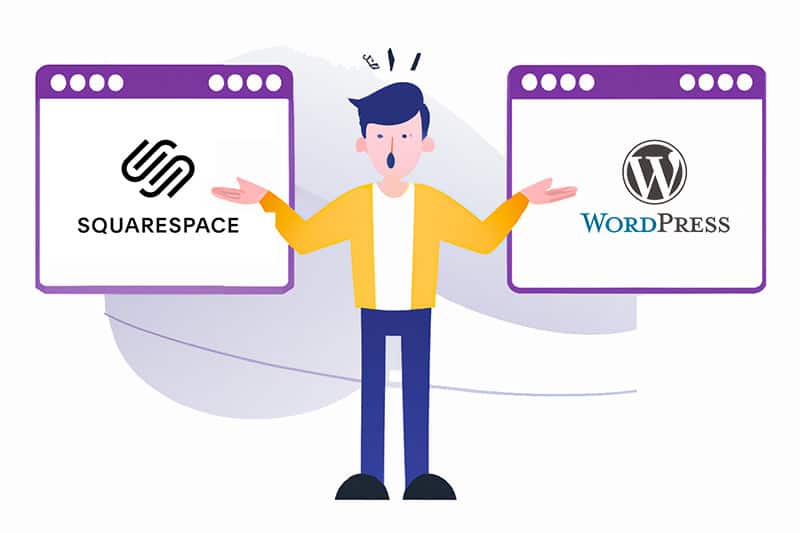Is Squarespace or WordPress the Right Fit for Your Business

It’s a question we are asked time and time again: should we build our new website using WordPress or Squarespace?
Honestly, it really depends on your budget, required functionality, scalability, and lastly, how much of the work you want and are able to do yourself.
With so many DIY website builders available (and professional website designers and developers for that matter), it really comes down to your business case. Choosing the right fit for your business can be overwhelming.
Squarespace and WordPress are content management systems (CMS), meaning that you have full control of your webpage content and can add, change and update your text and photos.
The differences start to become apparent when you dig a little deeper into what both platforms offer to businesses.
WordPress vs Squarespace Overview
Both WordPress and Squarespace take similar approaches to website building. However, for the sake of simplicity, I’ll focus on ease of use and the flexibility to customise the website look and feel to your needs, together with the ability to add additional functionality.
WordPress is the world’s most popular website builder, with over 43% of all websites built using the content management system.
How easy is it to create a website on Each Platform?
Squarespace
With Squarespace, you can have a basic website created within minutes. All you need to do is sign up for a Squarespace account, and your website is ready for you to start picking a Squarespace design template and adding in your content and images. Although you can use a Squarespace website without buying a domain name, most businesses will need one that matches their business objectives – e.g., scorchedmedia.com.au. If you want emails on your domain name, e.g., [email protected], you’ll also need to open a subscription with Google Workspace.
WordPress
WordPress is a bit different, but it’s still pretty straightforward. Before creating your WordPress website, you will need a domain name and web hosting. And let’s face it, if you are a business, you will want a domain name that reflects your business and professional emails at your domain as well.
With your domain name and hosting in place, WordPress is either a 1-click installation or it has already been installed by your web host, which creates a basic website, ready for you to pick a WordPress theme and, like Squarespace, start adding in your web page content and images.
Pre-made Website Template or Custom Website Design?
Here’s the simple truth about using pre-existing templates and themes on both platforms.
When you use pre-existing templates and themes for your website, you are limiting your online presence as it’s all about compromise.
Firstly, you need to find a template or theme that aligns with your brand’s image. Then, adapt it to convey your sales message effectively to your audience.
Additionally, resizing images to fit a specific space can be challenging.
The real problem with using pre-existing templates is that there’s a risk of another business, even a competitor, having the exact website design as yours. This can lead to confusion and lack of differentiation, even if the content differs.
This is where a professional website design is worth its weight in gold.
A professional website designer will ask a lot of questions before planning your website design. They will take the time to fully understand your business, including who your target audience is, who your competitors are, if you have corporate fonts and colours and a whole lot more.
Only when all this information is to hand will they set about designing your website in a way that truly reflects your brand and is unique to your business.
Can I add extra functionality to my website?
Squarespace and WordPress differ significantly in their ability to add additional website functionality.
Squarespace
Squarespace users a user-friendly interface, making it easy for non-technical users. The platform provides a drag-and-drop interface, making adding and arranging content on your website easy.
However, you only have a very limited selection of apps and tools to add extra functionality to your website.
With Squarespace, you’ll make your changes from one single screen. In this interface, you can:
- Edit content
- Adjust design styles
- Add in your Google Analytics
- Setup your social sharing buttons
- Manage basic SEO settings
WordPress
WordPress offers everything Squarespace does and much more, with adding additional functionality to your website as easy as selecting the plugin required from the plugin screen. The great part is that most are free!
WordPress has almost 60,000 plugins available to choose from. However, the challenge is knowing which plugin is fit for the purpose.
WordPress also offers a drag-and-drop interface. All you need to do is install a visual page builder.
- Need Social Share buttons? Install a plugin.
- Need to create an email form, you guessed it – install a plugin.
And, of course, with so many SEO plugins available, managing your website SEO requirements is extremely easy.
Due to the size of the WordPress plugin repository, there is almost always a plugin available to add the functionality you need. However, knowing which plugin best suits your needs can be a little daunting, but the benefits to your website are worth it.
This is where a professional website designer can step in, saving you valuable time and sometimes money.
What If I Need an eCommerce Website?
Squarespace and WordPress enable you to sell your products on your website and take online credit card payments, but functionality is the major difference.
Squarespace
Squarespace offers general eCommerce facilities, however, they are quite limited when compared to WordPress.
When it comes to getting paid, Squarespace limits you to only four payment gateways:
- PayPal
- Stripe
- Apple Pay
- Afterpay
Squarespace also charges payment transaction costs in addition to the processing fees charged by your payment gateway provider unless you upgrade your plan to a full e-commerce plan.
WordPress
When it comes to eCommerce online store websites, WordPress is streets ahead.
One of the most popular eCommerce Plugins is WooCommerce. WooCommerce is an extremely powerful and yet easy-to-use online store plugin.
CSV upload enables easy product creation and maintenance, contributing to your website’s scalability.
WooCommerce integrates with the same payment gateways as Squarespace, however, additional payment facilities are available via plugins. Best of all, WooCommerce does not charge additional transaction fees.
Countless plugins are available to extend the capabilities of your WordPress online store, including a magnitude of shipping options and the ability to sync with your point-of-sale system.
Website SEO
Website SEO, or search engine optimisation, is an essential ingredient in all successful websites. It helps search engines understand your service offerings and rank you higher in the search results.
The approach to SEO differs significantly between WordPress and Squarespace. Both offer on-page SEO management however, WordPress takes several steps further.
Squarespace
Squarespace offers a limited set of tools to manage the SEO component of your website.
It allows the customisation of titles, meta descriptions, image alt texts, and URLs for posts and pages, which is crucial for on-page SEO.
Squarespace will also automatically handle the creation and updating of sitemaps to tell Google about your website.
However, Squarespace lacks SEO plugins, which again limit you to its built-in features, meaning you need a solid understanding of SEO best practices. If you want to know more about SEO or need assistance, feel free to reach out to us.
WordPress
When it comes to SEO, WordPress delivers in spades. Offering the same base SEO options as Squarespace, with the aid of free plugins such as Yoast or RankMath, WordPress doubles down with the ability to handle the technical SEO aspects.
Yoast and Rankmath will assist users in ensuring their on-page optimisation is on point, while additional plugins will handle image management, page speed, sitemaps, and more, greatly improving your site’s on-page and technical SEO.
When it comes to SEO, there is a steep learning curve, and that’s where a professional SEO expert really delivers. They can take care of all of your website’s on-page and technical SEO aspects to ensure you rank as high as possible for your keywords and leave you to do what you do best. If you would like to find out more, feel free to read our articles on SEO.
Backups and Maintenance?
Once again, both take a different approach to site maintenance and backups due to the very nature of the platforms.
Squarespace
Squarespace handles all updates and maintenance on all websites built using its platform. However, it lacks a backup facility, which is essential if things go wrong.
WordPress
With WordPress, you’re responsible for handling the updates and maintenance of your website. But again, this can be managed with a plugin.
When it comes to backups, you have several options.
You can either install a backup plugin or create a scheduled backup using your hosting facility. Both are very simple to set up and make it easy to restore your website if things go south.
How Easy Is It To Switch Platforms?
Squarespace being a closed system, makes it quite difficult to move platforms, while with WordPress you are in total control.
Squarespace
Squarespace limits what you can export out of it’s content management system. You can export your website pages, one blog page and linked posts. However, you cannot export your product pages and album pages.
As you cannot download all of the files and database associated with your website, it’s safe to say you do not own your website.
WordPress
WordPress gives you total control and ownership of your website files and database.
WordPress enables you to export your database and all your files in a format that works with other website builders.
Even easier, you can always download a complete copy of your database and files from your website hosting facility.
So What’s the cheaper Option?
Squarespace offers a simple pricing model. You pick the plan you want, add your credit card details, and are on your way.
WordPress is free. Clear and Simple. However, you need a web hosting and domain name to get the ball rolling.
Different models, but which is cheaper? That’s the 64 million dollar question.
Squarespace
Squarespace states its pricing upfront. The cheapest plan starts at $192 per year, limited to only 20 pages on your website.
For most business websites, you will need to subscribe to the business plan, which is $300 annually.
Want to sell your products online and not pay extra transaction fees? The Squarespace eCommerce plans start at $408 per year.
On top of their published pricing, you will still need a domain name, which is around $25 annually for a .com.au, and a Google WorkSpace subscription for your email, which starts at $6 per user per month.
WordPress
There are several factors that will determine how much a WordPress website costs.
While WordPress is free, you will still need a website hosting and domain name. Most business website hosting starts around $20 per month, while a .com.au domain name is around $25 annually for a .com.au. Depending on your chosen web hosting facility, email addresses at your domain are provided free of charge.
You could incur additional costs if you decide to use premium third-party themes and plugins. Although not essential, the enhanced functionality they offer could be worth it.
Squarespace or WordPress: What’s better?
If your goal is to create a simple, straightforward website without concerns about design, flexibility and growth, Squarespace isn’t a bad choice and delivers it achieves what it sets out to do.
That being said, WordPress offers a more suitable platform with greater flexibility and functionality for most businesses. Although learning it is a little trickier, the payoff is definitely worth it.
But here’s the kicker
How much time do you have to plan, design and enter your content into your brand-new website?
How do you value your time, and what is your hourly rate?
Engaging a website design agency isn’t as expensive as you may fear. In fact, it could be much cheaper than you think.
A website designer can create a unique website design that truly showcases your business and ensures that your marketing message connects with your target market.
They will also help you choose what apps and plugins you need to deliver the functionality you need to create a website that grows with and meets your business goals.
Many website design agencies provide user training and manuals so you can get the most out of your new website; I know we do.
It costs nothing to have a conversation, so why not reach out to Scorched Media and discuss your website needs. We’d love to hear from you.




